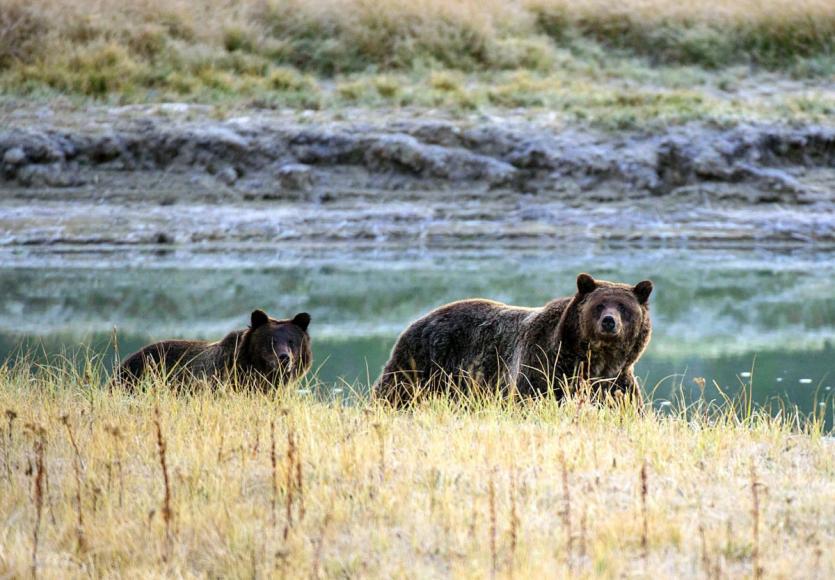A grizzly bear mother and her cub walk near Pelican Creek in Yellowstone National Park in Wyoming. Photo: AFP/Getty Images
 JULY 31st 2019
JULY 31st 2019
By Patryk Krych | The World Daily
Yellowstone Grizzly Bears Placed On Endangered List
On Tuesday, having abided by a court ruling back from last year that removal of the Yellowstone bears’ status as ‘under threat’ violated the Endangered Species Act, the United States Fish and Wildlife Service had enacted the restoration of federal protections to grizzly bears residing within and around Yellowstone National Park.
It was originally a decision made by the Trump administration, to “de-list” the Yellowstone grizzly bear from the protected species list, having been formally proposed back in 2016 during the Obama era of America. The decision was bad on a federal wildlife managers’ findings that the bear’s no longer had to be considered endangered due to their number rises in recent decades, having rebounded back to safe numbers that didn’t require federal safeguards. A decision that ended up attracting poachers and hunters.
The de-listing decision had in the end applied to about 700 bears thriving within the region, and had circumstantially led to plans for licensed trophy hunts for grizzly bears to areas in and adjacent to Yellowstone park – the first licensed trophy hunts of this kind in more than 40 years. Rebellion and protest had been sparked by several environmental groups, as well as Native American tribes, who’d even sued in federal court as a result whilst seeking to overturn the decision.
The groups had made the argument that removing grizzlies from the list was a pointless and destructive decision, as populations would eventually plunge again without protection. The groups had cited concerns that hunting and encroaching human development would without a doubt have posed several problems and threats to the species; a species that is slow to reproduce.
Siding with the protest groups was Dana Christensen, the United States District Judge in Missoula, Montana, having made a ruling last September that the agency had overstepped its boundaries and authority and that the decision made had failed to apply the best available science and logic in its evaluation of the grizzlies status, including ongoing threats to the bears in terms of existing illegal hunters in the areas.
The therefore successful reinstatement of Yellowstone Park grizzlies to the US threatened species list had put a final cap on, and closed many years of legal hunting over one of the most iconic and well respected animals roaming the popular region of the Northern Rockies that covers parts of Montana, Idaho and Wyoming.
When it de-listed the Yellowstone grizzlies from the list of protected species, which it stated had experienced robust and secure population growth, the Fish and Wildlife Service had said in a statement on Tuesday that it had employed the “best scientific and commercial data”, but that it would still be complying by the order of the judge regardless of the accusations.
In a statement, the agency said that “There is widespread public support for grizzly bear conservation, and the service continues to collaborate with state, federal, non-governmental, and tribal partners to research, monitor, and manage the iconic species and its habitats.”
In the Lower 48 American states, it is estimated that fewer than 2000 grizzlies still inhabit the areas overall, despite the species having still remained somewhat safe under federal protection in five other regions outside of Yellowstone. Ranchers are consistently arguing that a rebounding grizzly bear population may pose a large threat to their livestock, and on average tend to lean towards support of legalising killing of the grizzlies.
Republican Liz Cheney, Wyoming’s sole member of the US House of Representatives had referred to the actions taken on Tuesday as the “result of excessive litigation pursued by radical environmentalists’ intent on destroying our Western way of life.” Cheney stated herself that she had introduced legislation to attempt to restore the de-listing by an act of Congress, which would return the management of grizzlies back to the state.
By Patryk Krych | The World Daily






